So, I think that this would be fun. One of the things I alluded to in my last post regarding human nature both in plays and in writing plays was:
"I wonder what people would think if guys/girls suddenly did speak similarly to this. Would they be freaked out, or would they really enjoy it? Maybe we should try it out. :) We could even record the statistics and turn it into a math thing. That'd be fun."
So, I really think that I'd like to do that. If anybody could help me out with that by helping me compile a list of romantic sayings in Shakespeare throughout all his plays, that would be much appreciated. Afterwards, it'll be great to get a group together and try those out on people in a natural way. We could record what the reactions are numerically somehow, because I'd like to do some statistical analysis on that. We could see how well these lines will relate to people today. I'll go over the logistics of that a bit more so we can record data more efficiently.
What does everybody think? If it is successful, we can try it out with other genres too.
Wednesday, February 29, 2012
Tuesday, February 28, 2012
A deeper look at human nature
So, I was re-reading one of my first blogs (on bravery in Henry V) and I got to thinking about how characters ins Shakespeare's plays--and in stories in general--almost always seem to be up on a pedestal. They seem to exude all of the characteristics that we all want to have. Well, the protagonists at least. I don't think we wish we could murder like Claudius or scheme like Edmund. But then I got to thinking about A Midsummer Night's Dream. Now, there's definitely a lot of "love" going on here. But definitely not the normal kind. I don't know too many guys who would go up to a girl they like and say something along the lines of:
I wonder what people would think if guys/girls suddenly did speak similarly to this. Would they be freaked out, or would they really enjoy it? Maybe we should try it out. :) We could even record the statistics and turn it into a math thing. That'd be fun.
Anyway, back on task. Now, it may be because I just need to see it played out, but I feel like it would be interesting if a play were to delve deeper into the emotion of love than writers generally seem to do. After all, how many people do experience this sort of romantic development? We don't all have fairies to play with our lives. But this definitely does add to the feeling of mystery and allow the audience to slip away into a fantasy world powered by their own imagination.
So, that would be the challenge in writing a play about a deeper love--with the entire roller coaster affect of ups and downs, "do they like me?s," "why did this have to happen?s," etc. If you could still set it apart from people's lives, but somehow connect it on a deeper level, you could do this I suppose. So, it sounds pretty tough now that I am writing it, but I think it could turn out pretty interesting. And perhaps Shakespeare does have some a bit more like this. He definitely has downer moments in his tragedies, and A Midsummer Night's Dream is meant to be really light-hearted.
In any case, it just really made me wonder, and so I wanted to write a bit about that. I'm sure I'll revisit this a bit later on.
"I swear to thee, by Cupid's strongest bow, By his best arrow with the golden head, By the simplicity of Venus' doves, By that which knitteth souls and prospers loves, And by that fire which burn'd the Carthage queen..."
Anyway, back on task. Now, it may be because I just need to see it played out, but I feel like it would be interesting if a play were to delve deeper into the emotion of love than writers generally seem to do. After all, how many people do experience this sort of romantic development? We don't all have fairies to play with our lives. But this definitely does add to the feeling of mystery and allow the audience to slip away into a fantasy world powered by their own imagination.
So, that would be the challenge in writing a play about a deeper love--with the entire roller coaster affect of ups and downs, "do they like me?s," "why did this have to happen?s," etc. If you could still set it apart from people's lives, but somehow connect it on a deeper level, you could do this I suppose. So, it sounds pretty tough now that I am writing it, but I think it could turn out pretty interesting. And perhaps Shakespeare does have some a bit more like this. He definitely has downer moments in his tragedies, and A Midsummer Night's Dream is meant to be really light-hearted.
In any case, it just really made me wonder, and so I wanted to write a bit about that. I'm sure I'll revisit this a bit later on.
Saturday, February 25, 2012
New Design
By the way, I am totally open to suggestions regarding my new look. What does everybody think at the moment? Better? Worse? If there are any things you think could be improved, please let me know!!!
The Tempest: Wishbone Style
So, I know a lot of us like Wishbone. I figured this could be appreciated. And, just because it was cool, here was one of the comments:
Yep. I'm pretty sure that's how it is. I mean, who needed spark notes when you had Wishbone?!? In the immortal words of my brother: "I'm cultured. I watched Wishbone!" :)
best show ever. it is the single reason I am an English major.
hannahpoozer 10 months ago
Yep. I'm pretty sure that's how it is. I mean, who needed spark notes when you had Wishbone?!? In the immortal words of my brother: "I'm cultured. I watched Wishbone!" :)
Part 1
Part 2
Part 3
Thursday, February 23, 2012
The Lion King II: Simba's Pride
So, on Monday I spent a bit of time with my cousins. For a bit we watched The Lion King II. And yep, it's a sequel alright. Lion King: excellent movie. Lion King II: premise is alright for a movie, but the songs especially made me want to rip my ears out.
Anyway, it was interesting to hear some Shakespeare in it. First, here's the basic premise of the movie. You have the Pridelanders under Simba, and those who had followed Scar were exiled. They are the Outcasts. Kovu had been chosen by Scar to succeed him before his death. Now, near the beginning of the movie, Kovu and Simba's daughter (yep, don't remember her name, so I guess that shows what I REALLY cared for the movie overall...) meet, but Kovu gets busted because he is an Outcast who happens to be in the Pridelands after he and the daughter nearly get eaten by crocodiles. So, as Simba is talking about judgement and the price of an Outcast coming into the Pridelands, Kovu's mother says something along the lines of "He's just a young cub, but if you have to have your pound of flesh..." Hmmm. Interesting.

I can definitely see this movie as a bit of a mix between elements of both Romeo and Juliet (since the two lions are from "warring factions") and The Merchant of Venice (it's pretty clear-cut in the above paragraph why). So, my level of respect for the movie definitely went up a bit after I realized that. But it still isn't anywhere near the Hamlet-esque Lion King. I mean, you even have the littler elements represented! For example, Claudius sets up the fencing scene of the play, and he even poisons Laertes' sword. In the end, it comes back full circle and he dies with that sword--so all his plans and all the elements of the plan came back to kill him. With Scar, it was the hyenas. He used them to chase Simba away and increase his power, etc., but in the end they were the ones who turned on him and killed him. I thought parallels like that that were more hidden were pretty cool.
And now, just because it was right under the picture I used above (it must be a sign!) I'll put this here for the girls. This is somebody's rendition of Kovu as a human:
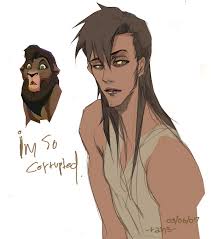
Anyway, it was interesting to hear some Shakespeare in it. First, here's the basic premise of the movie. You have the Pridelanders under Simba, and those who had followed Scar were exiled. They are the Outcasts. Kovu had been chosen by Scar to succeed him before his death. Now, near the beginning of the movie, Kovu and Simba's daughter (yep, don't remember her name, so I guess that shows what I REALLY cared for the movie overall...) meet, but Kovu gets busted because he is an Outcast who happens to be in the Pridelands after he and the daughter nearly get eaten by crocodiles. So, as Simba is talking about judgement and the price of an Outcast coming into the Pridelands, Kovu's mother says something along the lines of "He's just a young cub, but if you have to have your pound of flesh..." Hmmm. Interesting.
So, here is Kovu just a bit before the "pound of flesh" comment.
I can definitely see this movie as a bit of a mix between elements of both Romeo and Juliet (since the two lions are from "warring factions") and The Merchant of Venice (it's pretty clear-cut in the above paragraph why). So, my level of respect for the movie definitely went up a bit after I realized that. But it still isn't anywhere near the Hamlet-esque Lion King. I mean, you even have the littler elements represented! For example, Claudius sets up the fencing scene of the play, and he even poisons Laertes' sword. In the end, it comes back full circle and he dies with that sword--so all his plans and all the elements of the plan came back to kill him. With Scar, it was the hyenas. He used them to chase Simba away and increase his power, etc., but in the end they were the ones who turned on him and killed him. I thought parallels like that that were more hidden were pretty cool.
And now, just because it was right under the picture I used above (it must be a sign!) I'll put this here for the girls. This is somebody's rendition of Kovu as a human:
Wednesday, February 22, 2012
A few videos on King Lear
So, it's probably just me, but reading King Lear dug up some distant memory in my mind. That memory was this story (that goes to about 6:30):
It's so sad! Having seen it again now, it does have some good parallels to King Lear (yes, here is my justification for putting it up here).
First, there is a king. That's obvious. But I felt that he goes through a few of the same things that Lear goes through and, for that matter, Gloucester does too. He has a dear, dear friend. For Lear and Gloucester, this could be Cordelia and Edgar. Kent could fit here too. Anyway, in a fit of misguided rage the king gets rid of his good friend, whose only aim was the benefit of the king. In like manner, what did Cordelia, Edgar, and Kent all do, and why did they do it? After a time, the king realizes his mistake and feels great sorrow. So it was with Lear and Gloucester.
On another note, during the nights the king and his hawk had winds. Like a storm. Like King Lear was traipsing around in. And during the days they were scorched. Kind of like Lear experienced trying to live with Goneril and Regan.
Now, here's another video! Yay!
All I can say is, Lear should have been happy with Cordelia's fifty percent:
"Haply, when I shall wed, That lord whose hand must take my plight shall carry Half my love with him, half my care and duty."
After all, if Juan Cougar's girl can settle for eight percent, why shouldn't Lear settle for a full half???
Tuesday, February 21, 2012
Final Project Idea
So, I had wanted to start on it, but our class discussion sparked an idea for something to write about. Instead of a skeleton of a script written up, I have nothing. Here's a simple outline though. What does everybody think? (For those not involved in our class discussion, we talked a bit about coming up with something like a "lost play" or something like that and developing it. We talked a bit about running with Aubrie's idea here: Final Project Idea.)
First, I figured the main character could be Puck. (Yes, I had just read A Midsummer Night's Dream. It was fresh on my mind.)

Second, (I don't know why--maybe because because it had just been Valentine's Day) I thought we could possibly do something along the lines of Puck has girl-->Puck loses girl (break-up, tragic death, etc.).
Third, Puck develops a "black humour." So, basically, he bleakly does his tasks and overall depresses Oberon to the point where he is told to go shape up. So he goes to see the doctor or a wise man, or something like that. Here, he is told to de-stress and get a hobby. Suggestions could be tennis, chasing after girls (which obviously won't work this was the cause, but the "expert" could joke around with things like not actually catching them or doing a "catch-and-release" like fishing--something like that, depends on the person's character, etc. ...I hope the girls aren't too mad about that...), etc.
Fourth, Puck decides to go to the "local guru" of pranks. This happens to be Ariel. He is given some tasks--mostly the ones actually mentioned when Puck first appears in A Midsummer Night's Dream.

By the end, Puck can be the Puck we know is Shakespeare's play.
So, it's just a thought right now but I think that we could have some fun in this play, and we can tie in comedy at the end with some possible tragedy at the beginning in order to get a good feel for dealing with a variety of Shakespeare's works.
What does everybody think about that???
First, I figured the main character could be Puck. (Yes, I had just read A Midsummer Night's Dream. It was fresh on my mind.)
Second, (I don't know why--maybe because because it had just been Valentine's Day) I thought we could possibly do something along the lines of Puck has girl-->Puck loses girl (break-up, tragic death, etc.).
Third, Puck develops a "black humour." So, basically, he bleakly does his tasks and overall depresses Oberon to the point where he is told to go shape up. So he goes to see the doctor or a wise man, or something like that. Here, he is told to de-stress and get a hobby. Suggestions could be tennis, chasing after girls (which obviously won't work this was the cause, but the "expert" could joke around with things like not actually catching them or doing a "catch-and-release" like fishing--something like that, depends on the person's character, etc. ...I hope the girls aren't too mad about that...), etc.
Fourth, Puck decides to go to the "local guru" of pranks. This happens to be Ariel. He is given some tasks--mostly the ones actually mentioned when Puck first appears in A Midsummer Night's Dream.
By the end, Puck can be the Puck we know is Shakespeare's play.
So, it's just a thought right now but I think that we could have some fun in this play, and we can tie in comedy at the end with some possible tragedy at the beginning in order to get a good feel for dealing with a variety of Shakespeare's works.
What does everybody think about that???
A better view of blogging
So, I've been pretty lax about my blogging lately. I have a few things I have part-way done, but I need to finish them! I also need to fix some things that Professor Burton and I talked about.
So, here are the things that I am going to change to try to improve my blogging.
FIRST
Consistency!!! I need to be way more consistent on my blogging instead of putting up a bunch at the same time and leaving a dead spot in between. So, how about this. From now on I will always post SOMETHING every Thursday, Saturday, and Monday. Anything else will be extra. So, look for it!
SECOND
I need to change my design and enhance readability. So, how about this. By Saturday I'll have given my blog a makeover. Any suggestions?
THIRD
Social Outreach. I need to do it a whole lot better. So, I'll start doing that. Like, now. Right now.
FOURTH
I need to go more in depth with my analysis. So, I'll probably be re-visiting some of our plays and delving in a bit more.
So, that's the goal. Please help me!!!
So, here are the things that I am going to change to try to improve my blogging.
FIRST
Consistency!!! I need to be way more consistent on my blogging instead of putting up a bunch at the same time and leaving a dead spot in between. So, how about this. From now on I will always post SOMETHING every Thursday, Saturday, and Monday. Anything else will be extra. So, look for it!
SECOND
I need to change my design and enhance readability. So, how about this. By Saturday I'll have given my blog a makeover. Any suggestions?
THIRD
Social Outreach. I need to do it a whole lot better. So, I'll start doing that. Like, now. Right now.
FOURTH
I need to go more in depth with my analysis. So, I'll probably be re-visiting some of our plays and delving in a bit more.
So, that's the goal. Please help me!!!
Monday, February 20, 2012
We want, but we won't give
So, Claudius kind of reminded me of a monkey.

So, you might be asking yourself "How on earth does that tie in to this?" Well, here's how. But instead of just telling you, I'll link you to a story about it. It'll probably be more fun that way. Here it is!
The Monkey and the Juggler
So, many of you have probably heard of something like this before. Here is how it applies well to Claudius:
1. He began by seeing the bait: he wanted everything that his brother had (kingdom, riches, power, wife, etc.).
2. He then stuck his hand in and grabbed everything he wanted.
3. He was unwilling to let go.
The scene that best emphasizes this parallel is Act III Scene III. I'd suggest re-reading the end, where you have Claudius bemoaning his "wretched state" and "bosom black as death" juxtaposed with Hamlet's desire to avenge his father but unwilling to do so if it will send Claudius to heaven.
What I'd like for us to do now (on our own) is analyze how WE can be such monkeys too today. After all, human nature keeps a pretty steady course. Our actions often state along with Claudius: "May one be pardon'd and retain the offence?" In other words, can we be forgiven, but still keep everything we gained through our malignancy? We can all definitely find ways that we do the same thing, in a much smaller way (I hope). Just something to think about...
Probably exactly what Claudius looked like in Shakespeare's originals.
So, you might be asking yourself "How on earth does that tie in to this?" Well, here's how. But instead of just telling you, I'll link you to a story about it. It'll probably be more fun that way. Here it is!
The Monkey and the Juggler
So, many of you have probably heard of something like this before. Here is how it applies well to Claudius:
1. He began by seeing the bait: he wanted everything that his brother had (kingdom, riches, power, wife, etc.).
2. He then stuck his hand in and grabbed everything he wanted.
3. He was unwilling to let go.
The scene that best emphasizes this parallel is Act III Scene III. I'd suggest re-reading the end, where you have Claudius bemoaning his "wretched state" and "bosom black as death" juxtaposed with Hamlet's desire to avenge his father but unwilling to do so if it will send Claudius to heaven.
What I'd like for us to do now (on our own) is analyze how WE can be such monkeys too today. After all, human nature keeps a pretty steady course. Our actions often state along with Claudius: "May one be pardon'd and retain the offence?" In other words, can we be forgiven, but still keep everything we gained through our malignancy? We can all definitely find ways that we do the same thing, in a much smaller way (I hope). Just something to think about...
Tuesday, February 14, 2012
Hey, it's Valentine's Day!!!
So, here's a little something for the holidays.
Did anyone ever realize how perfect Savage Garden's "I Knew I Loved You" fits with the relationship between Miranda and Ferdinand in The Tempest???
Here, have a listen:
Here's my take on the lyrics:
This is just the introduction to their "love at first sight" love. Hence, "maybe it's intuition, and no, I am definitely NOT going to question it." They both definitely did feel the other was destined to be their best friend. (After all, nothing says BFFs like playing chess behind the curtain--but seriously, I do love chess...) We also spoke in class about the "love at first sight" thing they had going on. We could tie that into "I know that it might sound more than a little crazy..." to which, these days, we can rearrange to be "I know that it might sound more than a little crazy but this is BYU..." or something like that. See? Happens all the time.

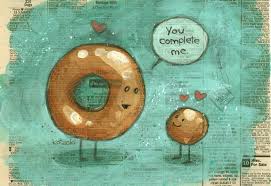
They are on a mystical island for crying out loud! In Act 3 Scene 3, Ferdinand's comrades were surrounded by "angels." So who's to say that it didn't happen for them too?
So, why did Ferdinand say Miranda was so beautiful? Surely as a prince that was at a marrying age, he'd seen all sorts of possible brides. I imagine that at least some of them were pretty good looking. They couldn't have all been inbred royalty, like this:
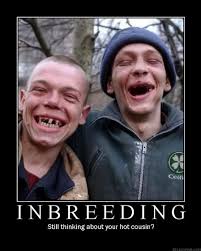
***Okay, I admit, that may be a bit of a stretch, but you have to go off the stereotypes sometimes, right???
I also wonder what makeup was like at the time, because if it was popular to look like this:

then I can completely understand his reaction. It'd be like he'd died and gone to heaven just to see ANY girl who looked normal. After all, for lot of guys like me it is much better to see a girl the way she more naturally looks. It just looks prettier and classier. I guess I do have a bias in that though. I'm the sort of guy that doesn't like tons of jewelry, but I do think that something like a single thin, silver chain necklace or something of the like is very attractive. I also think things like lip gloss were a great development because lipstick seems too overbearing at times, and gloss seems to match a more natural hue.
Did anyone ever realize how perfect Savage Garden's "I Knew I Loved You" fits with the relationship between Miranda and Ferdinand in The Tempest???
Here, have a listen:
"I Knew I Loved You"
Maybe it's intuition
But some things you just don't question
Like in your eyes
I see my future in an instant
and there it goes
I think I've found my best friend
I know that it might sound more than
a little crazy but I believe
But some things you just don't question
Like in your eyes
I see my future in an instant
and there it goes
I think I've found my best friend
I know that it might sound more than
a little crazy but I believe
This is just the introduction to their "love at first sight" love. Hence, "maybe it's intuition, and no, I am definitely NOT going to question it." They both definitely did feel the other was destined to be their best friend. (After all, nothing says BFFs like playing chess behind the curtain--but seriously, I do love chess...) We also spoke in class about the "love at first sight" thing they had going on. We could tie that into "I know that it might sound more than a little crazy..." to which, these days, we can rearrange to be "I know that it might sound more than a little crazy but this is BYU..." or something like that. See? Happens all the time.
[chorus:]
I knew I loved you before I met you
I think I dreamed you into life
I knew I loved you before I met you
I have been waiting all my life
I knew I loved you before I met you
I think I dreamed you into life
I knew I loved you before I met you
I have been waiting all my life
Um, can it get any more "love at first sight" than this? I don't really think I need to explain why I think the chorus ties into their love story...
There's just no rhyme or reason
only this sense of completion
and in your eyes
I see the missing pieces
I'm searching for
I think I found my way home
I know that it might sound more than
a little crazy but I believe
only this sense of completion
and in your eyes
I see the missing pieces
I'm searching for
I think I found my way home
I know that it might sound more than
a little crazy but I believe
This, I feel, is simply a continuation of what was just stated. They are basically thinking like this:
[repeat chorus]
A thousand angels dance around you
I am complete now that I found you
[repeat chorus to fade]
A thousand angels dance around you
I am complete now that I found you
[repeat chorus to fade]
Now, a thought:
So, why did Ferdinand say Miranda was so beautiful? Surely as a prince that was at a marrying age, he'd seen all sorts of possible brides. I imagine that at least some of them were pretty good looking. They couldn't have all been inbred royalty, like this:
***Okay, I admit, that may be a bit of a stretch, but you have to go off the stereotypes sometimes, right???
I also wonder what makeup was like at the time, because if it was popular to look like this:

then I can completely understand his reaction. It'd be like he'd died and gone to heaven just to see ANY girl who looked normal. After all, for lot of guys like me it is much better to see a girl the way she more naturally looks. It just looks prettier and classier. I guess I do have a bias in that though. I'm the sort of guy that doesn't like tons of jewelry, but I do think that something like a single thin, silver chain necklace or something of the like is very attractive. I also think things like lip gloss were a great development because lipstick seems too overbearing at times, and gloss seems to match a more natural hue.
Wednesday, February 8, 2012
Just a funny comic
So, it appears I'm the one who mostly posts funny stuff or something. I should probably analyze more. Maybe after this one...
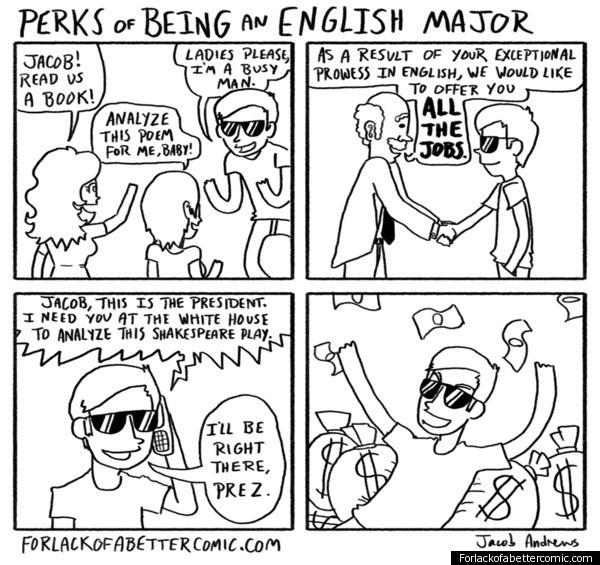

So, after this class we'll all have it made. 'Cuz we'll all have had experience with Shakespeare, so we can come to the president's rescue. Just sayin'.
More Math and Shakespeare
Well Professor, here's something more on math that you sparked. Just a little thing though. You wanted me to tie sin(x) in with Ophelia. Here's something you can look at between her, Hamlet, and trigonometric functions.
First, here is what normal cosine and sine functions look like:

Now, what does this graph make you think of?
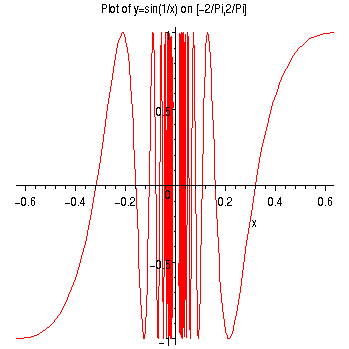
If you thought of both Hamlet and Ophelia going crazy, you are right! Think of the oscillations as the frantic thinking of a person's mind as it nears certain outside influences. Now, sin(1/x) has no real value when x=0. We can think of that as the point where a person no longer wants to live. So, where would Hamlet lie throughout his "to be or not to be" soliloquy? What path does Ophelia follow?
With that under your belts, this one is just another way to view it:
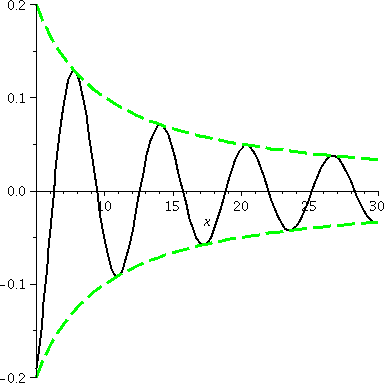
So, let's imagine that the distance you go to the right represents a certain distance into the future. For both Hamlet and Ophelia, they felt more and more constricted as time went on throughout the play. So, for this sine-looking function, I'd say it could represent they way they both felt. For example, let's take Ophelia. She begins by seeing Hamlet's love for her die. She feels pushed down. Then her father dies. She feels like she has lost everything. As these, and other, events take place, she feels pushed into a corner more and more until she reaches the point of "1/x."
First, here is what normal cosine and sine functions look like:
Now, what does this graph make you think of?

If you thought of both Hamlet and Ophelia going crazy, you are right! Think of the oscillations as the frantic thinking of a person's mind as it nears certain outside influences. Now, sin(1/x) has no real value when x=0. We can think of that as the point where a person no longer wants to live. So, where would Hamlet lie throughout his "to be or not to be" soliloquy? What path does Ophelia follow?
With that under your belts, this one is just another way to view it:

So, let's imagine that the distance you go to the right represents a certain distance into the future. For both Hamlet and Ophelia, they felt more and more constricted as time went on throughout the play. So, for this sine-looking function, I'd say it could represent they way they both felt. For example, let's take Ophelia. She begins by seeing Hamlet's love for her die. She feels pushed down. Then her father dies. She feels like she has lost everything. As these, and other, events take place, she feels pushed into a corner more and more until she reaches the point of "1/x."
Tuesday, February 7, 2012
On Hamlet
So, here's something I started before last class and am just now finally finishing (trying to delve deeper too after what we discussed in class):
Wow. Goodbye happy times.
There are a lot of dark, twisted events in Hamlet. This being my first time reading it, it definitely brought a few things to my mind that I definitely would not have connected without having read it.
First of all, there is no mercy in revenge in this play. Both Hamlet and Laertes were wholly bent on their revenge and nothing could keep them from it. For Laertes, he so quickly turned to revenge in the shadows by following Claudius' advice of foul play by using poison and trying to kill Hamlet without letting him know directly that it was now time for his revenge. No honor. This also surprised me more because his father had seemed like a decent fellow and the play began with a stark contrast between his seemingly good family and Hamlet's broken family. I thought he would have been a bit better than that. For Hamlet, he chose to postpone killing his uncle in case his uncle would go to heaven. He wanted to see him burning in Hell instead. In addition, he coldly sent his former friends Rosencrantz and Guildenstern to die. He had no thought but to get his revenge, and he lost everything in the bargain. Again, there was no honor in his sense of vengeance either.
Going over Hamlet's "to be or not to be" soliloquy was really interesting too. Here one of the things we as "Denmark" learned while we went over this monologue:
First, we found a running theme with water running throughout his monologue. It begins with the "sea of troubles" he is facing. Later, we found that a bourn is a small stream, especially one that flows intermittently or seasonally. Additionally, it could also be used to denote a goal or destination. Finally, it ends with his loss of resolve as he states "With this regard their currents turn awry, and lose the name of action." It is interesting how Shakespeare uses this to tie everything together. I feel as though it can represent his level of desire to act . We determined that he was closest to action at the beginning, and this is the point where the water is a sea. I picture it as a sea during the storm, with white frothy crests coming over the side of the ship, lightning, billowing surges, etc. Later on, though, it becomes a small stream that only flows from time to time. After thinking about life after death (i.e. hell), he hardly wants to and it is only intermittently. After thinking a bit more, the "currents turn awry." At this point, his desire is nothing but a small trickle. It's like a dry riverbed in the desert. He isn't going to do anything. I thought that this was a brilliant way of layering the meaning in Hamlet's words.
Wow. Goodbye happy times.
There are a lot of dark, twisted events in Hamlet. This being my first time reading it, it definitely brought a few things to my mind that I definitely would not have connected without having read it.
First of all, there is no mercy in revenge in this play. Both Hamlet and Laertes were wholly bent on their revenge and nothing could keep them from it. For Laertes, he so quickly turned to revenge in the shadows by following Claudius' advice of foul play by using poison and trying to kill Hamlet without letting him know directly that it was now time for his revenge. No honor. This also surprised me more because his father had seemed like a decent fellow and the play began with a stark contrast between his seemingly good family and Hamlet's broken family. I thought he would have been a bit better than that. For Hamlet, he chose to postpone killing his uncle in case his uncle would go to heaven. He wanted to see him burning in Hell instead. In addition, he coldly sent his former friends Rosencrantz and Guildenstern to die. He had no thought but to get his revenge, and he lost everything in the bargain. Again, there was no honor in his sense of vengeance either.
Going over Hamlet's "to be or not to be" soliloquy was really interesting too. Here one of the things we as "Denmark" learned while we went over this monologue:
First, we found a running theme with water running throughout his monologue. It begins with the "sea of troubles" he is facing. Later, we found that a bourn is a small stream, especially one that flows intermittently or seasonally. Additionally, it could also be used to denote a goal or destination. Finally, it ends with his loss of resolve as he states "With this regard their currents turn awry, and lose the name of action." It is interesting how Shakespeare uses this to tie everything together. I feel as though it can represent his level of desire to act . We determined that he was closest to action at the beginning, and this is the point where the water is a sea. I picture it as a sea during the storm, with white frothy crests coming over the side of the ship, lightning, billowing surges, etc. Later on, though, it becomes a small stream that only flows from time to time. After thinking about life after death (i.e. hell), he hardly wants to and it is only intermittently. After thinking a bit more, the "currents turn awry." At this point, his desire is nothing but a small trickle. It's like a dry riverbed in the desert. He isn't going to do anything. I thought that this was a brilliant way of layering the meaning in Hamlet's words.
Something for all to think about
So, on Thursday I am going to be talking with one of the actors from The Merchant of Stratford. Does anybody have any questions they'd like me to ask him? I was planning on talking a bit about getting into character, planning the play, etc. and I'm just wondering what everybody else is interesting in learning about. Just leave me questions in the comments section!
Monday, February 6, 2012
Learning Outcomes Check-up
Here's a quick check-up on how I feel I am doing according to our class learning outcomes:
1. Gain Shakespeare Literacy
I feel like I have done pretty well in this aspect. I understand a lot more of Shakespeare now than I did before taking this class, and as we go over different parts of the play each class I feel like I have a better and better understanding of what's actually going on and why so many people do like Shakespeare.
2. Analyze Shakespeare Critically
This is definitely something I feel I can work on more. As we discussed in our last class, our reviews weren't necessarily the best. I still have something coming from that where I plan to talk to one of the actors about what went into making the play, but I definitely feel like I can delve deeper into different aspects of each play a lot better than I do at the moment.
3. Engage Shakespeare Creatively
I haven't done enough for this yet. I do want to do a recording of myself with some lines. Before it was suggested in our last class I had thought it would be something fun to do (immediately following having us try to read Hamlet's soliloquy over in "Denmark"). There's also the project to think about, although as of yet I don't have any solid plans for it. This is something I really look forward to doing more in the future, but I suppose I need to sit down and get some solid direction before I can really sink my teeth into it.
4. Share Shakespeare Meaningfully
This is something that I have tried to do a bit. I have definitely brought up Shakespeare a lot more this semester than ever before (especially since before this class I NEVER brought it up). Usually, the people I mention it too aren't interested, but sometimes they are. For example, I did go the the play with somebody, and in the future she said she would show me some of the movies that she likes that are based on Shakespeare's plays and I planned to blog about those times too.
5. Gain Digital Literacy
The blog itself, of course, is a big part of this one. How have I done? At the beginning, I was just getting into blogging, so it was pretty slow. Then I had a week or week and a half where I posted a lot. And then midterms came and it pretty much came to a halt. So overall, I think I've only done an average job of this and I should really set some times aside to blog every week so I don't fall into the rut I am now (hopefully) out of. That way I won't slack again next time midterms roll around.
1. Gain Shakespeare Literacy
I feel like I have done pretty well in this aspect. I understand a lot more of Shakespeare now than I did before taking this class, and as we go over different parts of the play each class I feel like I have a better and better understanding of what's actually going on and why so many people do like Shakespeare.
2. Analyze Shakespeare Critically
This is definitely something I feel I can work on more. As we discussed in our last class, our reviews weren't necessarily the best. I still have something coming from that where I plan to talk to one of the actors about what went into making the play, but I definitely feel like I can delve deeper into different aspects of each play a lot better than I do at the moment.
3. Engage Shakespeare Creatively
I haven't done enough for this yet. I do want to do a recording of myself with some lines. Before it was suggested in our last class I had thought it would be something fun to do (immediately following having us try to read Hamlet's soliloquy over in "Denmark"). There's also the project to think about, although as of yet I don't have any solid plans for it. This is something I really look forward to doing more in the future, but I suppose I need to sit down and get some solid direction before I can really sink my teeth into it.
4. Share Shakespeare Meaningfully
This is something that I have tried to do a bit. I have definitely brought up Shakespeare a lot more this semester than ever before (especially since before this class I NEVER brought it up). Usually, the people I mention it too aren't interested, but sometimes they are. For example, I did go the the play with somebody, and in the future she said she would show me some of the movies that she likes that are based on Shakespeare's plays and I planned to blog about those times too.
5. Gain Digital Literacy
The blog itself, of course, is a big part of this one. How have I done? At the beginning, I was just getting into blogging, so it was pretty slow. Then I had a week or week and a half where I posted a lot. And then midterms came and it pretty much came to a halt. So overall, I think I've only done an average job of this and I should really set some times aside to blog every week so I don't fall into the rut I am now (hopefully) out of. That way I won't slack again next time midterms roll around.
Wednesday, February 1, 2012
Review of The Merchant of Venice
So, last Saturday when we all went to see the Merchant of Venice, I had gone with some mixed feelings. Mostly just because of how Antonio (an older man in my mind) was to be Antonia (a younger woman) and how it appeared online that the Prince of Morocco was to be white (I guess you can't help that though, but it threw me off!).
In the end, though, I really liked it. I think it really served the purpose that was chosen for it, which was, in my mind, definitely a difficult undertaking.
To begin with, there were a couple of things, either because of how the play was performed or simply by seeing it acted out instead of me merely reading it, that really opened my eyes more. For example, the unfairness of the entire play toward Shylock stood out a lot more in large part because of the great portrayal of Shylock and small things the cast did like when Antonia spit on Shylock at the very beginning. Another thing that struck me differently was seeing Bassanio as a jerk to Shylock. It is definitely ingrained in me that "the good guy gets the girl" (yes that is a reference to Megamind), yet Bassanio got the girl and was really really mean in many ways to Shylock. He had absolutely no respect as one should have toward another human being.
Another thought that I had during the play was how well the cast acted to help younger kids understand. For one, Portia could easily relate to middle school girls. She was so giddy, or so cruel, depending on the suitor. In addition, having the audience act out certain parts--especially main parts like Nerissa's--was an excellent touch. It was really engaging for all of the audience as the kids were so cute acting along, and it is so much more fun for them too. I do believe that, despite all dialogue being in Shakespeare's prose, everyone was able to better understand the plot because they were actually able to be physically involved in the play.
Finally, I really liked how there was a definite moral at the end of this play. They started by applying it to kids in school with Bassanio's dinosaur being stolen and with him then being teased. At this time I thought to myself: "Great. Just great. This is going to be a long hour. I left shows like this (where the acting is over the top as they are portraying children fighting) behind a long time ago because I cannot stand them!" And then I was pleasantly surprised by a great play. It was good, in my opinion, to start this way because they were then able to finish with an appeal to the audience. "Was it fair? What was right? How should it have been? What would you have done?" Finishing like that really was a great touch.
In the end, though, I really liked it. I think it really served the purpose that was chosen for it, which was, in my mind, definitely a difficult undertaking.
To begin with, there were a couple of things, either because of how the play was performed or simply by seeing it acted out instead of me merely reading it, that really opened my eyes more. For example, the unfairness of the entire play toward Shylock stood out a lot more in large part because of the great portrayal of Shylock and small things the cast did like when Antonia spit on Shylock at the very beginning. Another thing that struck me differently was seeing Bassanio as a jerk to Shylock. It is definitely ingrained in me that "the good guy gets the girl" (yes that is a reference to Megamind), yet Bassanio got the girl and was really really mean in many ways to Shylock. He had absolutely no respect as one should have toward another human being.
Another thought that I had during the play was how well the cast acted to help younger kids understand. For one, Portia could easily relate to middle school girls. She was so giddy, or so cruel, depending on the suitor. In addition, having the audience act out certain parts--especially main parts like Nerissa's--was an excellent touch. It was really engaging for all of the audience as the kids were so cute acting along, and it is so much more fun for them too. I do believe that, despite all dialogue being in Shakespeare's prose, everyone was able to better understand the plot because they were actually able to be physically involved in the play.
Finally, I really liked how there was a definite moral at the end of this play. They started by applying it to kids in school with Bassanio's dinosaur being stolen and with him then being teased. At this time I thought to myself: "Great. Just great. This is going to be a long hour. I left shows like this (where the acting is over the top as they are portraying children fighting) behind a long time ago because I cannot stand them!" And then I was pleasantly surprised by a great play. It was good, in my opinion, to start this way because they were then able to finish with an appeal to the audience. "Was it fair? What was right? How should it have been? What would you have done?" Finishing like that really was a great touch.
Subscribe to:
Comments (Atom)